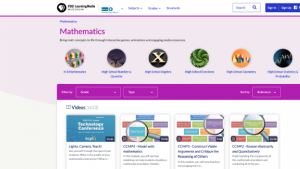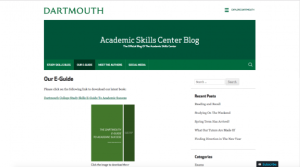General Interest
Back to Top
|
 |
|
Instruments of Change
|
Science |
|
Much of the work of modern science is made possible by the development of technology, such as instruments that enable scientists to measure the levels of a particular chemical compound in the water or air. Readers curious to learn how some of these technologies came to be and how they impact society may enjoy Instruments of Change, a digital exhibit from the folks at the Science History Institute (formerly the Chemical Heritage Foundation). Part of the Arnold O. Beckman Legacy Project, Instruments of Change incorporates archival photos, videos, and interactive features to invite visitors to explore the stories of five groundbreaking 20th-century scientific instruments: the oxidant recorder, the EASE analog computer, Beckman's historic pH meter, the infrared spectrophotometer, and Linus Pauling's oxygen meter. Each instrument's section explains its history and how it impacts life today. For example, the oxidant recorder, developed in the late 1940s, was an important part of how Los Angeles (and later, other cities) gained the ability to monitor its air quality and issue alerts when smog levels became dangerous to public health. This exhibit is best viewed in a full-screen browser window and may not perform well on mobile devices. [JDC] |
|





|
|
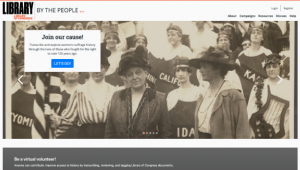 |
|
Library of Congress: By the People
|
Social studies |
|
The Library of Congress (LOC) is home to a vast repository of documents, many of which have been digitized but need to be transcribed to become fully searchable. Launched by the LOC in November 2018, By the People is the web platform for the LOC's crowdsourced document transcription campaigns. Here, anyone interested in participating can "transcribe, review, and tag digitized images of manuscripts and typed materials from the Library's collections." In addition to making the documents searchable, these transcriptions also make them accessible to readers with vision challenges, or who are unable to decipher the handwriting from decades past. The materials available for transcription run the gamut of the LOC's diverse holdings. Current transcription campaigns include the papers of multiple leading suffragists like Mary Church Terrell, the manuscripts of poet Walt Whitman, and letters written to Abraham Lincoln. For educators interested in using By the People in their classrooms, the site provides a collection of teaching ideas and LOC lesson plans relevant to some of the campaigns. No account registration is required to participate in By the People, but those who choose to register can access additional features, such as reviewing other volunteers' transcriptions. [JDC] |
|





|
|
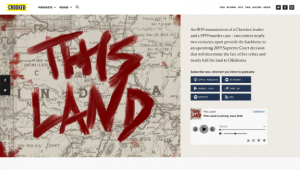 |
|
 |
|
Pew Research Center: Decoded
|
Mathematics |
|
Readers interested in learning more about how the Pew Research Center collects and analyzes its data and creates its visualizations may want to check out Pew's blog Decoded, hosted on Medium. Launched in June 2018, Decoded describes itself as providing "the 'how' behind the numbers, facts and trends shaping your world." Many articles in Decoded include how-to explanations for using software like R or Python to perform a specific task, which could make this a helpful resource for readers who are developing their own data analysis skills. Other articles take a broader approach, discussing how Pew handles challenges inherent to their work, such as how researchers adapt their survey methods to account for shifts in the way people use (and talk about) the internet, or how researchers can future-proof their work to avoid "technical debt" by ensuring that their code is clean and well-documented. While the language used in Decoded is largely approachable for general audiences, its content will likely be of greater interest to those with some background in the social sciences, data science, or statistics. [JDC] |
|





|
|
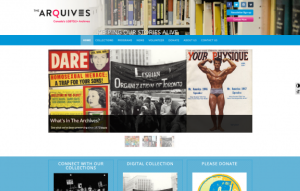 |
|
The ArQuives: Canada's LGBTQ2+ Archives
|
Social studies |
|
Founded in 1973, the ArQuives is a Toronto-based organization "dedicated to celebrating, preserving, and collecting the stories and histories of LGBTQ2+ people in Canada." Known as the Canadian Lesbian and Gay Archives until March 2019, the ArQuives recently made their extensive research collections publicly searchable online. These collections include a wide variety of material, such as "the world's largest collection of LGBTQ+ periodicals," personal papers, organizational records, photographs, and posters, with items dating back to the 1800s. Visitors can search the collections by keyword, or they can use the Advanced Search feature to search within a specific date range and narrow by fields like subject, material type, place, and those that include online images. Under Advanced Search, visitors can also browse by collection name or by material types. In addition to their collections database, the ArQuives also created a Digital Exhibitions section that makes numerous highlights from their collections viewable online. More than 900 items can be viewed here, and this section also contains 17 exhibits with multiple images and informative commentary. As of this write-up, the ArQuives is led by Raegan Swanson, the organization's executive director and a PhD candidate at the University of Dundee. [JDC] |
|





|
|









